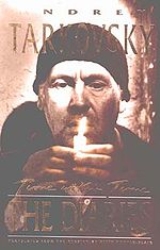
Time Within Time: The Diaries 1970-1986
Encyclopedia
Time Within Time: The Diaries 1970-1986 (also known as Martyrolog) are the diaries of the Russian
filmmaker Andrei Tarkovsky
. They cover his life and work in the Soviet Union and the time of his exile in Western Europe. After the 1991 coup several memos surfaced that alleged that the KGB
had at times access to the diaries. Although Tarkovsky did not openly oppose the Soviet system, his work heavily emphasized spiritual themes, that were at conflict with the official anti-religious atheist ideology
, prompting the KGB to open a file on him.
. The first English
edition was published in 1991, translated by Kitty Hunter-Blair, who also translated Sculpting In Time
. This edition is also known as the Calcutta edition as it was published first in India. The Russian original was not officially published until 2008. Other notable translations include the French
and the Polish
edition, which both are among the most complete editions of the diaries. Other translations include the Czech
, Italian
and Japanese
editions of the diaries.
Russians
The Russian people are an East Slavic ethnic group native to Russia, speaking the Russian language and primarily living in Russia and neighboring countries....
filmmaker Andrei Tarkovsky
Andrei Tarkovsky
Andrei Arsenyevich Tarkovsky was a Soviet and Russian filmmaker, writer, film editor, film theorist, theatre and opera director, widely regarded as one of the finest filmmakers of the 20th century....
. They cover his life and work in the Soviet Union and the time of his exile in Western Europe. After the 1991 coup several memos surfaced that alleged that the KGB
KGB
The KGB was the commonly used acronym for the . It was the national security agency of the Soviet Union from 1954 until 1991, and was the premier internal security, intelligence, and secret police organization during that time.The State Security Agency of the Republic of Belarus currently uses the...
had at times access to the diaries. Although Tarkovsky did not openly oppose the Soviet system, his work heavily emphasized spiritual themes, that were at conflict with the official anti-religious atheist ideology
Religion in the Soviet Union
The Soviet Union was the first state to have as an ideological objective the elimination of religion and its replacement with atheism. To that end, the communist regime confiscated religious property, ridiculed religion, harassed believers, and propagated atheism in schools...
, prompting the KGB to open a file on him.
The Diaries
Tarkovsky called his diaries also Martyrolog. He said about this title in 1974: "Pretentious and false as a title, but let it stay as a reminder of my ineradicable, futile worthlessness." The diaries are deeply personal and were intended mainly for Tarkovsky himself. They cover his life and work in the Soviet Union and during the time of his exile. Sometimes entries are seemingly trivial, as for example shopping lists or entries on his health. Another frequent topic are other film directors or artists, which Tarkovsky generally regarded with a negative attitude. At other time Tarkovsky discusses philosophical or film theoretical questions, not necessarily related to day to day events. Tarkovsky kept his diary until shortly before his death on December 29, 1986. The last entry was on December 15, 1986. His last words were "But now I have no strength left - that is the problem".Editorial history
The diaries have been translated from its Russian original into 15 different languages, sometimes with significant differences. The diaries were first published in 1989 in GermanGerman language
German is a West Germanic language, related to and classified alongside English and Dutch. With an estimated 90 – 98 million native speakers, German is one of the world's major languages and is the most widely-spoken first language in the European Union....
. The first English
English language
English is a West Germanic language that arose in the Anglo-Saxon kingdoms of England and spread into what was to become south-east Scotland under the influence of the Anglian medieval kingdom of Northumbria...
edition was published in 1991, translated by Kitty Hunter-Blair, who also translated Sculpting In Time
Sculpting In Time
Sculpting In Time is a book by Russian filmmaker Andrei Tarkovsky about art and cinema in general, and his own films in particular. It was originally published in 1986 in German shortly before the author's death, and published in English in 1987, translated by Kitty Hunter-Blair...
. This edition is also known as the Calcutta edition as it was published first in India. The Russian original was not officially published until 2008. Other notable translations include the French
French language
French is a Romance language spoken as a first language in France, the Romandy region in Switzerland, Wallonia and Brussels in Belgium, Monaco, the regions of Quebec and Acadia in Canada, and by various communities elsewhere. Second-language speakers of French are distributed throughout many parts...
and the Polish
Polish language
Polish is a language of the Lechitic subgroup of West Slavic languages, used throughout Poland and by Polish minorities in other countries...
edition, which both are among the most complete editions of the diaries. Other translations include the Czech
Czech language
Czech is a West Slavic language with about 12 million native speakers; it is the majority language in the Czech Republic and spoken by Czechs worldwide. The language was known as Bohemian in English until the late 19th century...
, Italian
Italian language
Italian is a Romance language spoken mainly in Europe: Italy, Switzerland, San Marino, Vatican City, by minorities in Malta, Monaco, Croatia, Slovenia, France, Libya, Eritrea, and Somalia, and by immigrant communities in the Americas and Australia...
and Japanese
Japanese language
is a language spoken by over 130 million people in Japan and in Japanese emigrant communities. It is a member of the Japonic language family, which has a number of proposed relationships with other languages, none of which has gained wide acceptance among historical linguists .Japanese is an...
editions of the diaries.

